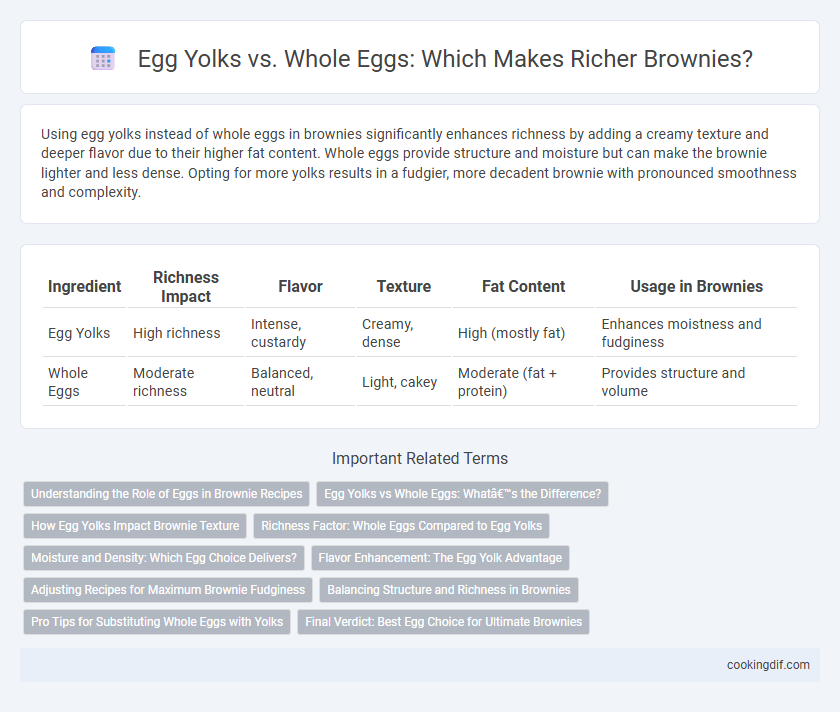Using egg yolks instead of whole eggs in brownies significantly enhances richness by adding a creamy texture and deeper flavor due to their higher fat content. Whole eggs provide structure and moisture but can make the brownie lighter and less dense. Opting for more yolks results in a fudgier, more decadent brownie with pronounced smoothness and complexity.
Table of Comparison
| Ingredient | Richness Impact | Flavor | Texture | Fat Content | Usage in Brownies |
|---|---|---|---|---|---|
| Egg Yolks | High richness | Intense, custardy | Creamy, dense | High (mostly fat) | Enhances moistness and fudginess |
| Whole Eggs | Moderate richness | Balanced, neutral | Light, cakey | Moderate (fat + protein) | Provides structure and volume |
Understanding the Role of Eggs in Brownie Recipes
Egg yolks contribute a richer, denser texture to brownies by adding fat and emulsifiers that improve moisture retention and tenderness. Whole eggs provide structure and leavening through proteins and air incorporation, resulting in a lighter, cakier brownie. Balancing yolks and whole eggs in a recipe allows bakers to control richness and texture to achieve the desired fudgy or fluffy consistency.
Egg Yolks vs Whole Eggs: What’s the Difference?
Egg yolks contribute a higher fat content and richness to brownies compared to whole eggs, resulting in a denser and more fudgy texture. Whole eggs provide both fat and protein, creating a balanced structure that yields a lighter, cakier brownie. Understanding the difference in fat and protein ratios between egg yolks and whole eggs helps bakers control the texture and richness of their brownies.
How Egg Yolks Impact Brownie Texture
Egg yolks significantly enhance brownie richness by increasing fat content, which results in a denser, more tender texture compared to whole eggs. The emulsifiers in yolks promote a smoother batter, contributing to a moist, velvety crumb that intensifies flavor depth. Using egg yolks alone reduces the egg white's protein, minimizing structure formation and creating a fudgier, less cakey brownie.
Richness Factor: Whole Eggs Compared to Egg Yolks
Whole eggs provide a balanced richness to brownies, combining the creamy fat of yolks with the structure-building proteins of whites, resulting in a tender yet stable crumb. Egg yolks alone intensify the richness and moisture, adding a velvety texture and deeper flavor but can produce a denser, more custard-like brownie. Using whole eggs in brownies offers optimal richness with a harmonious texture, while egg yolks create a richer, more decadent treat at the expense of some firmness.
Moisture and Density: Which Egg Choice Delivers?
Using egg yolks in brownies increases richness and density by adding more fat, resulting in a moist, fudgy texture. Whole eggs contribute both moisture and structure with their combination of whites and yolks, producing a balanced crumb that's slightly lighter. For maximum moisture and dense texture, egg yolks outperform whole eggs by intensifying fat content and reducing overall water, enhancing brownie richness.
Flavor Enhancement: The Egg Yolk Advantage
Egg yolks contribute a richer, creamier texture and deeper flavor to brownies than whole eggs because they contain higher fat content and natural emulsifiers. The fat in yolks enhances the chocolate's intensity, creating a more luscious and velvety mouthfeel that elevates the overall taste experience. Using only egg yolks intensifies the brownie's flavor profile, resulting in a decadent dessert with superior richness and moisture retention.
Adjusting Recipes for Maximum Brownie Fudginess
Using egg yolks instead of whole eggs significantly enhances brownie fudginess by increasing fat content and reducing water, which yields a denser, creamier texture. Adjusting traditional brownie recipes to replace whole eggs with extra yolks intensifies richness and moistness without compromising structure. Optimizing yolk-to-flour ratios ensures maximum fudginess and decadent flavor in homemade brownie batches.
Balancing Structure and Richness in Brownies
Egg yolks contribute more fat and emulsifiers, enhancing the richness and moistness in brownies, while whole eggs provide essential proteins for structure and leavening. Using a higher ratio of yolks to whole eggs achieves a denser, fudgier texture with improved tenderness. Balancing yolks and whole eggs optimizes both the depth of flavor and the desired firmness in brownie consistency.
Pro Tips for Substituting Whole Eggs with Yolks
Using egg yolks instead of whole eggs in brownie recipes increases fat content, resulting in a richer, fudgier texture with enhanced moisture retention. Pro tips for substitution include using two yolks for every whole egg to maintain structural integrity while intensifying creaminess and ensuring even mixing to avoid batter separation. Adjust baking time slightly as yolk-rich batters may cook faster due to higher fat concentration, preserving optimal brownie density and flavor.
Final Verdict: Best Egg Choice for Ultimate Brownies
Using egg yolks in brownies enhances richness and creates a denser, fudgier texture due to their higher fat content. Whole eggs provide structure and a balanced moisture level, resulting in a classic brownie with a slight chewiness and tender crumb. For the ultimate brownies, whole eggs are recommended to achieve the perfect harmony of moistness, density, and structure.
Egg yolks vs whole eggs for brownie richness Infographic

 cookingdif.com
cookingdif.com